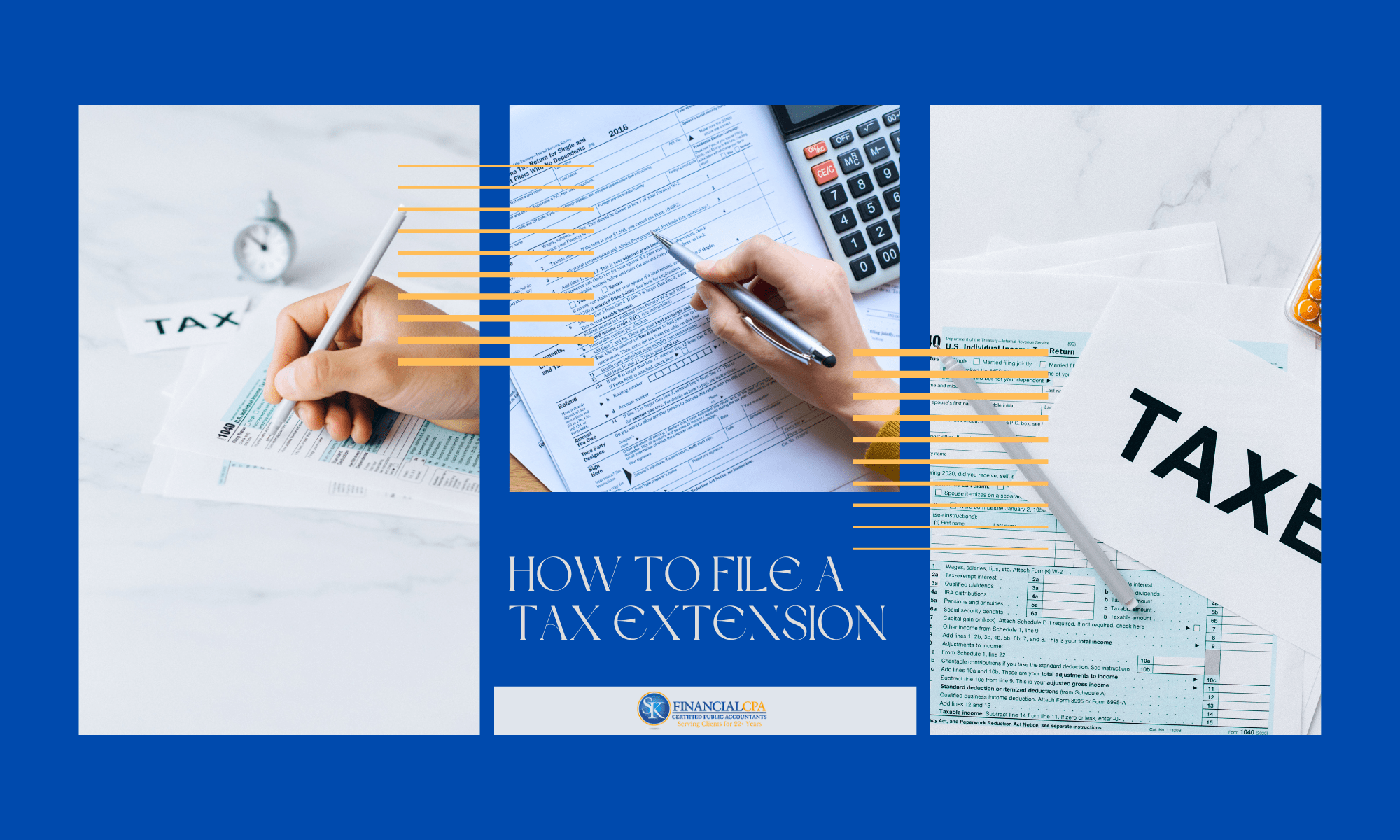
How to file your taxes in 2024
The tax season can often be a source of stress and anxiety for many taxpayers. The looming deadline, the gathering of numerous documents, and the intricate calculations can make the process daunting. Fortunately, the Internal Revenue Service (IRS) provides an option for those who find themselves unprepared as the deadline approaches: filing a tax extension. This blog delves deep into how to file a tax extension and how you can last day to file taxes 2024, emphasizing the importance of understanding this process to ensure you make informed decisions and avoid penalties.
Introduction to Filing a Tax Extension
Understanding how to file a tax extension is crucial for anyone who may not be able to complete their tax return by the due date. A tax extension allows you additional time to file your taxes without facing the steep penalties associated with late filing. However, it's essential to note that this extension applies only to the filing of the return, not the payment of any taxes owed. This distinction is a critical aspect of understanding how to file a tax extension and managing your tax obligations effectively.
When is the last day to file taxes 2023?
In 2023, the last day to file taxes in the United States for the tax year 2022 varied slightly from the usual April 15 deadline due to some factors. The deadline was April 18, 2024, for most taxpayers. This extension was granted because April 15, 2024, fell on a Saturday, and April 16, 2024, was Emancipation Day, a legal holiday observed in Washington, D.C. However, if you resided in Maine or Massachusetts, the deadline was April 17, 2024, because of the observance of Patriots' Day in those states. Additionally, taxpayers who requested an extension were granted until October 15, 2024, to file their taxes. It's important to be aware of these variations and to stay updated on any changes to filing deadlines.
The IRS has extended tax deadlines in several states due to severe storms and natural disasters.
| State | Deadline |
| California | June 17, 2024 |
| Connecticut | June 17, 2024 |
| Maine | June 17, 2024 |
| Michigan | June 17, 2024 |
| Rhode | June 17, 2024 |
| Tennessee | June 17, 2024 |
| Washington | June 17, 2024 |
| Alaska | July 15, 2024 |
The Rationale Behind Filing a Tax Extension
There are numerous reasons why taxpayers opt to file a tax extension. Some may be waiting on essential documents, such as a K-1 form that reports income from partnerships, S corporations, estates, or trusts, which may not arrive in time. Others might be dealing with personal circumstances, such as illness or the need to resolve discrepancies in their financial records. By learning how to file a tax extension, taxpayers can grant themselves the time needed to address these issues thoroughly.
Step-by-Step Guide on How to File a Tax Extension
1. Determine Your Need for an Extension
The first step in understanding how to file a tax extension is to assess your situation. Are you missing critical documents? Do you need more time to consult with a tax professional? Identifying the reason for the extension can help you plan accordingly and ensure that you use the extra time effectively.
2. Be Aware of the Deadline
The deadline to file a tax extension typically aligns with the regular tax filing deadline, which is usually April 15 in the United States. If this date falls on a weekend or a legal holiday, the deadline is pushed to the next business day. Mark this date in your calendar as the absolute latest you can submit your request for a tax extension.
3. Choose Your Filing Method
When considering how to file a tax extension, you have two primary options: electronic filing or paper filing. Electronic filing (e-filing) is generally quicker and more convenient, offering immediate confirmation of your extension request. The IRS provides various e-filing options through its Free File partners. Alternatively, you can file a paper request by mailing Form 4868 to the appropriate IRS address. Choosing the right method depends on your personal preference and access to digital resources.
4. Estimate and Pay Any Owed Taxes
One of the most crucial steps in filing a tax extension is estimating and paying any taxes you owe by the original filing deadline. Failing to do so can result in interest and penalties on the unpaid amount. Utilize the IRS's tax estimation tools and resources or consult with a tax professional to calculate your tax liability accurately.
5. Complete and File Your Tax Return by the Extended Deadline
After successfully filing your tax extension, you will have until the extended deadline, typically October 15, to file your complete tax return. Use the extra time to gather necessary documentation, resolve any financial discrepancies, and ensure the accuracy of your tax return. Procrastination can lead to a rushed filing process, which increases the risk of errors and potential issues with the IRS.
Additional Tips for Filing a Tax Extension
-
Document your request for a tax extension and any payments made. This documentation can be crucial if there are any discrepancies or questions from the IRS.
-
If the process of filing a tax return or a tax extension seems overwhelming, consider seeking the assistance of a tax professional. Their expertise can provide guidance and help you navigate the complexities of tax law.
-
Use this experience to better prepare for next year's tax season. Start organizing your documents early, keep track of important deadlines, and consider working with a tax professional throughout the year to avoid the need for a future extension.
Filing a tax extension can provide much-needed relief if you're unable to complete your tax return by the deadline. By understanding how to file a tax extension, you can take control of your tax situation, avoid unnecessary penalties, and ensure that your tax return is accurate and complete. Remember, the extension grants additional time for filing, not for payment, so it's essential to estimate and pay any owed taxes by the original deadline. With proper planning and organization, you can navigate tax season more confidently, whether you file on time or request an extension.
FAQs
1. What is a tax extension?
A tax extension is a request made to the Internal Revenue Service (IRS) for additional time to file your annual tax return. It's important to understand that this extension applies only to the filing of the tax documents and not to any tax payment due. The standard extension period is six months, which moves the filing deadline from April 15 to October 15 for most taxpayers.
2. How long does a tax extension last?
The length of a tax extension is typically six months. This extension period is designed to provide taxpayers with sufficient time to accurately complete their tax returns, especially in cases where they are waiting for additional information or need more time to organize their financial records. The extension changes the filing deadline from the traditional April 15 to October 15.
3. How do I know if I need a tax extension?
Determining whether you need a tax extension depends on your specific situation. Common reasons for needing an extension include not receiving all the necessary tax documents, facing personal emergencies, or simply requiring more time to ensure your tax return is accurate and complete. If you find yourself in a situation where the April 15 deadline is approaching and you're not ready to file, it's likely a good idea to consider requesting an extension.
4. How do I apply for a tax extension?
Applying for a tax extension can be done in two primary ways: electronically through the IRS's e-file system or by mailing a paper form, specifically Form 4868, to the IRS. The electronic method is faster and provides immediate confirmation of receipt. To file electronically, you can use the IRS Free File system or a tax software program. If you choose to mail your request, ensure it's postmarked by the original April 15 deadline.
5. Is there a cost to file a tax extension?
No, there is no fee charged by the IRS to file for a tax extension. However, it's critical to remember that the extension does not apply to any tax payments you may owe. To avoid late payment penalties and interest, you should estimate and pay any owed taxes by the April 15 deadline.
6. Can I file a tax extension if I owe money?
Yes, you can file for a tax extension even if you owe taxes. However, it's important to estimate the amount of tax you owe and make that payment by April 15. Failing to pay taxes owed by the original deadline can result in penalties and interest accruing on the unpaid amount, even if you've received an extension to file.
7. What happens if I don’t file my taxes or an extension by April 15?
If you miss the April 15 deadline without filing your taxes or requesting an extension, the IRS can impose late filing penalties and interest on any unpaid taxes. The penalty for filing late is typically 5% of the unpaid taxes for each month or part of a month that a tax return is late, up to a maximum of 25%. If you owe taxes, additional penalties and interest for late payment will also accrue.
8. Can I still get a refund if I file a tax extension?
Yes, filing a tax extension has no impact on your eligibility for a tax refund. If you are due a refund, you will receive it after you file your return, regardless of whether you filed by the original deadline or used an extension. However, the sooner you file your return, the sooner you can expect to receive your refund.
9. Do I need to give a reason for my tax extension request?
No, the IRS does not require you to provide a reason for requesting a tax extension. You simply need to submit your request by the April 15 deadline to receive the automatic six-month extension.
10. What should I do if I'm not ready to file by the extension deadline?
If the October 15 extended deadline is approaching and you are still not ready to file, it's essential to file your return as soon as possible to minimize potential penalties and interest. At this point, you may also want to consult with a tax professional for advice on how to proceed and to ensure your tax return is completed accurately and in compliance with IRS regulations.
Follow SKFinancial on Facebook / Twitter / Linkedin / Youtube for updates.








